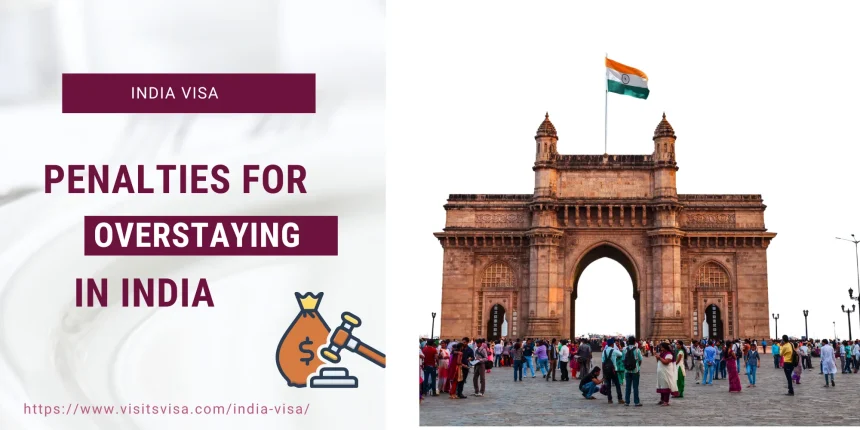Foreigners living in India must follow visa rules to avoid fines and penalties. Overstaying your visa in India can have serious consequences. Fines for exceeding the permitted length of stay vary depending on the length of stay. Typically, fines range from a nominal amount for a short period to a very large fine for a longer period. Additionally, individuals may face deportation, visa cancellation, and future entry restrictions.
It is mandatory for foreign nationals visiting or residing in India to comply with visa requirements and ensure timely departure to avoid legal repercussions and maintain a positive immigration record.
If you, as a non-native, overstay your India visa, you may face serious legal consequences, fines, and possibly debarment from future trips.
Explore the consequences of overstaying in India to avoid complications.
Effects of Exceeding Indian Visa Restrictions
Overstaying in India beyond your visa allowance can result in serious penalties, including imprisonment of up to 5 years, substantial fines, and the possibility of permanent exclusion from re-entry.
India has increasingly tightened its immigration rules, so keep the following in mind when considering a long-term stay in India without a valid visa.
Financial Penalties for Overstaying an Indian Visa
Monetary sanctions are one of the immediate consequences of overstaying in India. This penalty varies, increasing with the duration of the visa violation.
The Department of Homeland Security of India outlines the penalties depending on the extent of overstaying the visa period as follows:
- Overstaying a visa for less than 90 days attracts a fine of US$300.
- There is a fine of US$ 400 for overstaying a visa between 91 days and 2 years.
- A fine of US$ 500 will be imposed for overstaying for more than 2 years.
If this fails to prevent you from overstaying your Indian visa, please be aware of the possible legal consequences other than fines that you may face.
Future travel bans and difficulties in getting visas for other countries
As global citizens, the possibility of future travel restrictions and visa difficulties could pose significant challenges to our mobility and freedom. In an increasingly interconnected world, where travel has become an integral part of both personal and business life, any restrictions on movement could have a profound impact.
Furthermore, the Indian government has the power to impose legal fines on tourists who overstay their welcome, making their travel illegal.
This means you may face restrictions on travel to India in the future and possible difficulties in obtaining visas for other countries.
Legal consequences of overstaying an Indian visa
Overstaying on an Indian visa can have serious legal consequences. First, individuals may face fines for overstaying each day, which will lead to significant financial liabilities. Additionally, those who overstay are at risk of deportation, which can result in immediate removal from the country and a possible ban on future entry.
Additionally, individuals may face difficulties obtaining visas for other countries due to their overstay records, which may affect their international travel prospects. Additionally, overstaying may tarnish one’s immigration history, potentially affecting future visa applications and legal residence status.
Indian law also grants immigration officers the power to impose imprisonment for up to 5 years in severe cases.
While this consequence is rarely enforced, it remains a possibility depending on the circumstances of your overstay.
Understanding the Validity of an Indian Tourist Visa
First and foremost, it is illegal to overstay your visa or maximum permitted stay in India, regardless of the reason.
However, we acknowledge that visa terms can be confusing. Here’s how to understand your visa validity on your visa confirmation/sticker:
If you possess a 30-day Indian Tourist eVisa:
- Expiry date: Latest date of entry into India. Entry after this date is prohibited, requiring a new visa application.
- Maximum stay: You can stay for up to 30 days from the arrival date, even if it exceeds the expiry date.
Example:
If the expiry date is March 22, 2024:
- You cannot enter India after March 22, 2024.
If you possess a 1-year or 5-year Indian Tourist eVisa:
- Expiry date: Latest departure date from India (usually 1 or 5 years from the date of issue). This date tells when you would have left India.
- Maximum stay: Maximum number of days per visit, not to exceed expiration date or passport expiration date.
For example, for a 1-year visa with an expiry date of March 22, 2025:
- You can enter India anytime before March 22, 2025.
- The indicated stay is up to 180 days per visit, not exceeding March 22, 2025, or the expiry of your passport (whichever is earlier).
Consider these scenarios:
- If you arrive on March 12, 2025, you only have 10 days before departure.
- If you arrive on April 14, 2024, you have 180 days to leave (October 11, 2024), with the option to re-enter later.
- If your passport expires on February 20, 2025, you must leave India on or before that date.
For 5-year visas with an expiry date of March 22, 2029, the same principles apply.
Please note: Although not an official order, it is generally advised to maintain a gap of two months (60 days) between two visits to India on a multiple-entry tourist visa.
Steps to take if you have overstayed your Indian visa
If, for any reason, you find yourself overstaying your Indian visa, prompt action is imperative. follow these steps:
- Get help from an immigration attorney.
- Assess eligibility for exemption from consequences.
- Strictly follow the laws of the country.
- Be patient and wait for the solution.
Although there is no guarantee of avoiding or reducing penalties for overstaying a visa, following these steps can increase your chances of avoiding legal consequences.
Seeking Extension of an Indian Visa
It is possible to extend your Indian Tourist visa beyond its original expiry, although subject to case-by-case approval.
We recommend starting the extension process upon arrival in the country or at least allowing enough time before visa expiration. Under no circumstances should you overstay your visa, even while waiting for extension approval.
To extend your stay in India while complying with visa rules, apply for a visa extension at the Foreigners Regional Registration Office (FRRO), where officers will guide you through the process.
For more details about locations check the official FRRO website.
Contact Us for Clarifications on Your Indian Visa Validity
If you have any inquiries or require verification of the validity of your India Visa or you want to India visa apply online, feel free to contact us via online chat or WhatsApp. We are here to help!








